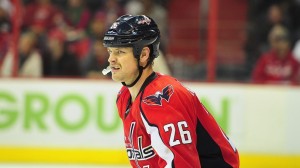If you were to take an average hockey fan from the end of the 2009 NHL season and tell them that Alexander Ovechkin, who was then coming fresh off of back-to-back Hart Trophy victories as NHL MVP, would be routinely playing less minutes per night in the playoffs than his team’s third line, that hockey fan would probably call you crazy.

After all, Ovechkin took the NHL by storm in 2005 and beyond as an elite, minute-munching superstar that franchises often can only dream about having.
But here we are, midway through the second round of the playoffs, and Ovechkin’s ice time minutes are nowhere where most would expect. After averaging more than 23 minute of ice time per playoff game thus far in his career, Ovi is barely cracking 20 per game this post-season.
In Saturday’s game versus the New York Rangers, his ice time (15:09) was less than that of grinders Jay Beagle (18:13) and Matt Hendricks (17:03).
The most amazing thing is that new Caps system under head coach Dale Hunter, which emphasizes tight checking and hard work, seems to be working better for the team than their old ways of speed, skill, and passing the puck to Ovechkin whenever they got the chance. The Caps used their grinding ways to get the win on Saturday 3-2, tying the series against the East’s #1 seeded Rangers at 2-2.
Now, tight, defensive, 1-goal hockey is nothing new. Teams have been doing it with much success lately, even after all the new rule changes that came about after the lockout. But it sure is strange for the Caps, who were the epitome of firewagon hockey under former coach Bruce Boudreau, leading the league in goals scored in 2009-2010 with 318.
But for all the flash and fireworks that came with Boudreau, the team was never able to find success in the post season, despite being one of the NHL’s powerhouse teams under his tutelage and winning the President’s Trophy in 2009-2010. Year after year the Caps would disappoint in the playoffs, never making it past the second round.
However, for all the flak he’s received since taking over the job behind the Capitals bench (mainly for cutting Ovi’s minutes), Hunter has been taking his team on a tear in 2012, as they are playing some of the best playoff hockey that Washington has seen since the lockout. The Caps knocked off the defending champion Boston Bruins in round one, and are now tied with the top-seeded Rangers, and look more than capable of completing another upset.
With a deep roster that’s remained relatively unchanged over the past few seasons, and gritty warriors like Beagle and Hendricks leading by example, the Capitals are out to prove themselves after years of disappointment.
What makes the team dangerous compared to other teams that play similar styles, however, is that the Caps still have the same firepower as before, making them fully capable of scoring the ever-so-important big goals at crucial junctions.
Mike Green scored the game winner on Saturday with 5:48 left in the third, while Ovechkin scored the game-winner in game 2 with 7:27 left in the third. Despite the team’s stars getting somewhat shackled offensively, they’re still finding ways to score huge goals when their team needs them to.
And really, what team wouldn’t want the ability to keep a game tied going late when you have players like Ovechkin, Green, Nicklas Backstrom and Alexander Semin? All are more than capable of finishing a play when they find an open opportunity.
There has been much talk among NHL pundits whether Hunter will get fired at the end of the season, regardless of how far the Capitals go in the playoffs. But judging by how much better they’re playing than everyone expected them to this post season, and that the team hasn’t yet had one full year to completely adjust to Hunter’s coaching, it would be unwise to move on without realizing the full potential that their superstar-laden checking system can achieve.